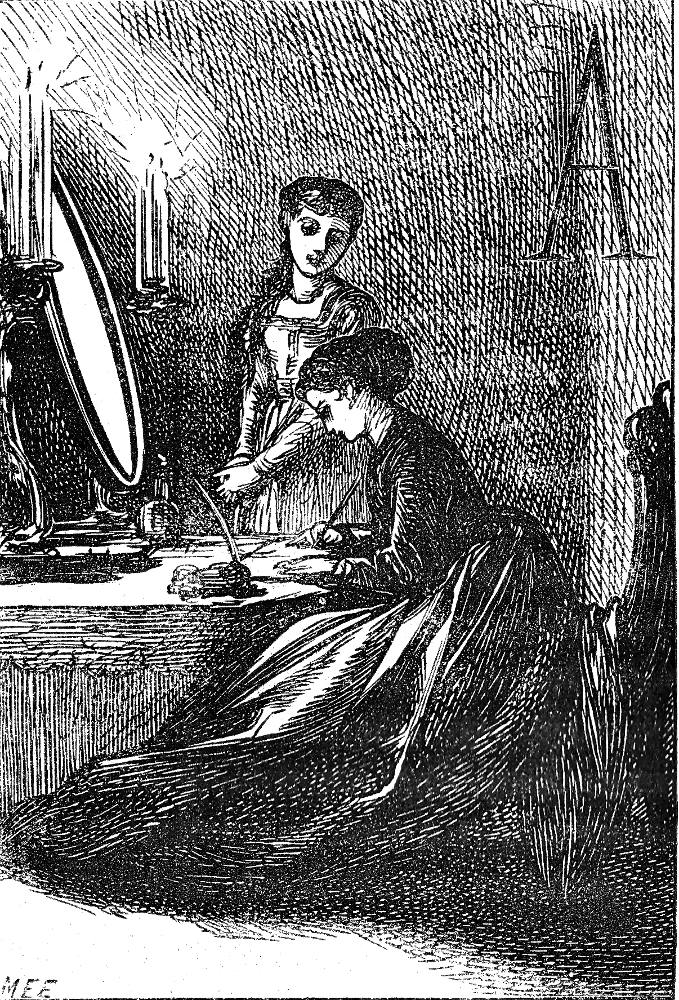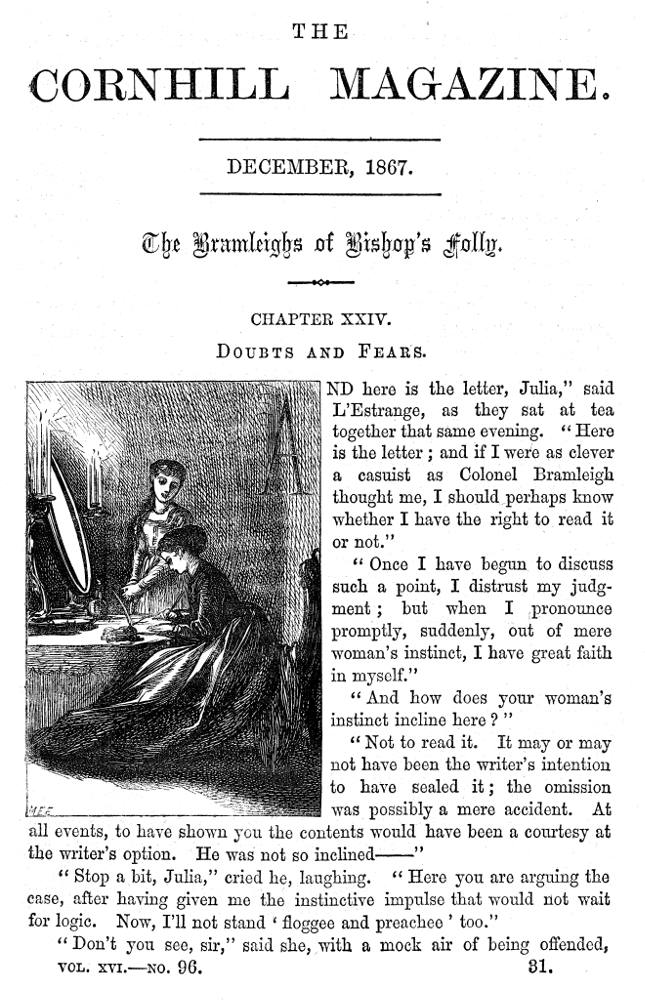

Initial-letter Vignette "A" (Julia L'Estrange and Ellen Bramleigh in Nelly's dressing-room) (Vol. XVI, page 641) vertically-mounted, 7.5 cm high by 5 cm wide, signed "MEE." in the lower-left corner; also in the lower-left corner of the main illustration. Mary Ellen Edwards, final thumbnail vignette illustration for Charles Lever's The Bramleighs of Bishop's Folly in the Cornhill Magazine (December 1867), Chapters XXIV-XVII ("Doubts and Fears" through "The Villa Altieri.") in Vol. 16: pages 641 through 666 (26 pages including unpaged illustration in instalment). The wood-engraver responsible for this illustration was Joseph Swain (1820-1909), noted for his engravings of Sir John Tenniel's cartoons in Punch. [Click on the image to enlarge it; mouse over links.]
This initial-letter vignette introduces the passage towards the end of the chapter:
Nelly and Julia did not go to bed till daybreak. They passed the night writing a long letter to Jack, — the greater part being dictated by Julia while Nelly wrote. It was an urgent entreaty to him to yield to the advice of his brother officers, and withdraw the offensive words he had used to the Admiral. It was not alone his station, his character, and his future in life were pressed into the service, but the happiness of all who loved him and wished him well, with a touching allusion to his poor father's condition, and the impossibility of asking any aid or counsel from him. Nelly went on: “Remember, dear Jack, how friendless and deserted I shall be if I lose you; and it would be next to losing you to know you had quitted the service, and gone Heaven knows where, to do Heaven knows what.” She then adverted to home, and said, “You know how happy and united we were all here, once on a time. This is all gone; Marion and Temple hold themselves quite apart, and Augustus, evidently endeavoring to be neutral, is isolated. I only say this to show you how, more than ever, I need your friendship and affection; nor is it the least sad of all my tidings, the L'Estranges are going to leave this. There is to be some new arrangement by which Portshandon is to be united to Killmulluck, and one church to serve for the two parishes. George and Julia think of going to Italy. I can scarcely tell you how I feel this desertion of me now, dearest Jack. I'd bear up against all these and worse — if worse there be — were I only to feel that you were following out your road to station and success, and that the day was coming when I should be as proud as I am fond of you. You hate writing, I know; but you will, I'm sure, not fail to send me half a dozen lines to say that I have not pleaded in vain. I fear I shall not soon be able to send you pleasant news from this, the gloom thickens every day around us; but you shall hear constantly.” The letter ended with a renewed entreaty to him to place himself in the hands and under the guidance of such of his brother officers as he could rely on for sound judgment and moderation. “Remember, Jack, I ask you to do nothing that shall peril honor; but also nothing in anger, nothing out of wounded self-love.”
“Add one line, — only one, Julia,” said she, handing the pen to her, and pushing the letter before her; and without a word Julia wrote: “A certain coquette of your acquaintance — heartless, of course, as all her tribe — is very sorry for your trouble, and would do all in her power to lessen it. To this end she begs you to listen patiently to the counsels of the present letter, every line of which she has read, and to believe that in yielding something — if it should be so — to the opinion of those who care for you, you acquire a new right to their affection, and a stronger title to their love.” [Vol. XVI, Chapter XXIV, "Doubts and Fears," pp. 652-653]
Commentary: Comparing Female Confidences and Relationships
Instead of focussing on the male protagonist and his fortunes in this serial instalment, Edwards compares the friendly and confidential relationship of two of the young female principals, Ellen Bramleigh and Julia L'Estrange at the Castello in Ireland, with that of Lady Augusta Bramleigh and her confidante, the socially conservative Italian aristocrat, Countess Balderoni, in the parlour of the Villa Altieri on a slope of the Pincian Hill in Rome. In the vignette, the friends (shortly to become sisters-in-law) counsel Jack Bramleigh to apologize to the Admiral, whom he has insulted, rather than abandon his naval career.
Scanned image and text by Philip V. Allingham. [You may use this image without prior permission for any scholarly or educational purpose as long as you (1) credit the person who scanned the image and (2) link your document to this URL in a web document or cite the Victorian Web in a print one.]
Bibliography
Lever, Charles. The Bramleighs of Bishop’s Folly. The Cornhill Magazine 15 (June, 1867): pp. 640-664; 16 (July-December 1867): 1-666; 17 (January-June 1868): 70-663; 18 (July-October 1868): 1-403. Rpt. London: Chapman & Hall, 1872. Illustrated by M. E. Edwards; engraved by Joseph Swain.
Stevenson, Lionel. "Chapter XVI: Exile on the Adriatic, 1867-1872." Dr. Quicksilver: The Life of Charles Lever. London: Chapman and Hall, 1939. Pp. 277-296.
Created 28 August 2023